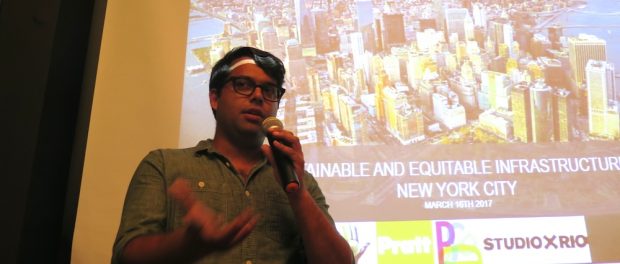Week-Long Exchange Shares Sustainable Infrastructure Strategies in New York and Rio
On Thursday March 16, in collaboration with Catalytic Communities, urban planning and architecture Masters students from Brooklyn’s Pratt Institute’s Programs for Sustainable Planning and Development, City and Regional Planning, and Sustainable Environmental Systems—led by professor Leonel Ponce–held a workshop at Studio-X Rio introducing just and sustainable infrastructure from New York City that might inspire action in Rio de Janeiro.
Following a week of exchanges with community leaders in seven favelas, coordinated and facilitated by CatComm, the event brought together Pratt students with community members, activists, journalists, and academics to discuss challenges facing urban communities in Rio and New York. The workshop examined the planning and implementation of infrastructure projects in New York City, and looked into the various economic, physical, social, political, and environmental factors that impact infrastructure implementation in both cities. One of the goals of the Pratt Institute students’ research and discussion was to discover and discuss potential parallel or replicable just and sustainable frameworks for development.
Pratt Institute students presented case studies focused on improving urban sewerage, energy systems, farming, community gardens, water, sanitation, and waste management. The case studies included the Billion Oyster Project, Brooklyn Grange, Gardens Rising, Here Comes Solar, Hudson Yards, Newtown Creek Wastewater Treatment Plant, Park Slope Food Coop, and Stone Barns Center for Food and Agriculture. Their full presentation is available here (check back soon for updated file with references):
New York and Rio can seem worlds apart with regard to the formality of their infrastructure. However, in talking about the history of community gardens in New York, Pratt students revealed a story of long-term grassroots occupation and resistance. During the financial crisis in the 1970s, people began occupying vacant and abandoned public land on the Lower East Side of Manhattan, planting “seed bombs” until years later the city government officially recognized and supported the growing community garden movement.
Other stand-out issues were sewage and waste management. At varying degrees, sewage is a problem for both New York and Rio. New York is served by a combined sewer system, and during wet weather events the system is often overwhelmed, resulting in combined raw sewage and storm water being released into the nearest body of water, resulting in contaminated water. Only 70% of the population of Rio is connected to a formal sanitation system, and only about half of their sewage is treated. Lack of sewage collection and untreated waste causes a variety of health and environmental issues, such as the attraction of mosquitoes and rats and pollution of the Guanabara Bay.
Communities in both cities are attempting to address their respective sewage problems. In New York, the combined sewer overflow problems are being addressed through green infrastructure and community gardens. In Rio, favela Vale Encantado has implemented biodigesters which treats sewage with a biosystem. Biosystems are sustainable sewage systems that turn waste into resources. They convert organic waste into biogas through anaerobic digestion. The biogas produced can be used for heat and electricity. The liquid the biodigester produces flows into a system of plants with long roots that purifies the water. Afterwards, this purified water returns to the forest without chemical treatment.
After the presentations by Pratt Institute students, there was a Q&A in which local researchers and community leaders voiced comments, concerns, ideas, challenges, and questions. The discussion stressed the importance of continued local community organizing, leveraging social media, crowdfunding, and changing dominant narratives. One point made was the need to change the way we think about waste. There is this idea that trash can simply be thrown away, but nothing truly disappears or goes away. This rhetoric of disposability in conversations about waste is also often used against poor and black people, and in the Rio context, against people who live in favelas. Favela residents are not disposable, and perhaps sustainable infrastructure in favelas, like the biosystem in Vale Encantado, can help change the disposability narrative of favelas.



